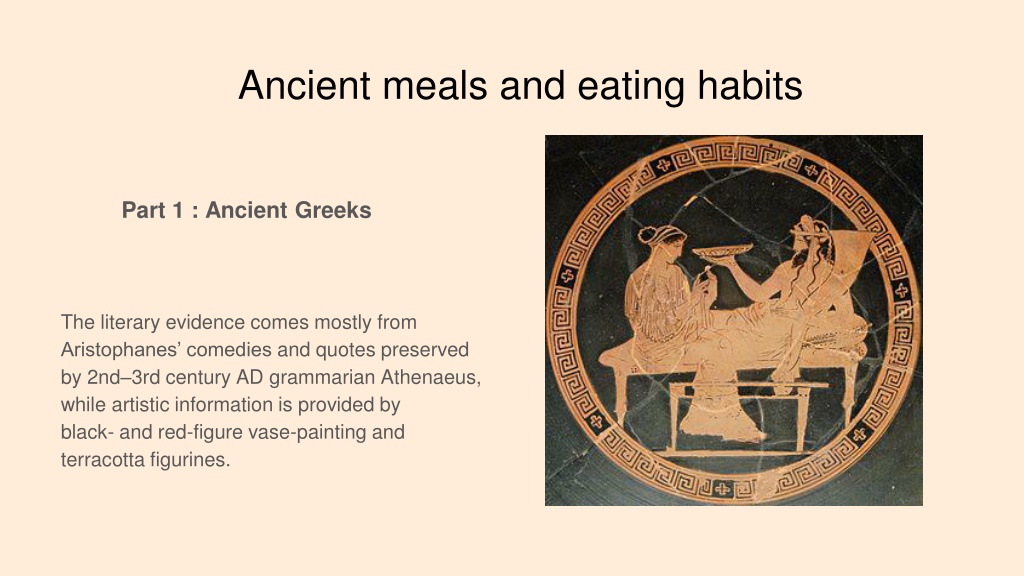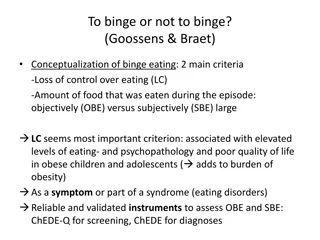Ancient Greek Meals and Eating Habits: Part 1 - Insights into Ancient Greek Nutrition and Dining Practices
Ancient Greeks had a unique approach to meals and eating habits, as depicted in literary works by Aristophanes and Athenaeus, along with artistic representations. Their food had dual symbolism, both religious and cultural, showcasing their identity and civilization. Greek cuisine was simple yet rich in cereals, fruits, vegetables, olive oil, and wine. The Greeks typically had three main meals - Akratismos (breakfast), Ariston (lunch), and Deipnon (dinner) - featuring a variety of foods reflecting their frugal and flavorful dietary choices.
Download Presentation

Please find below an Image/Link to download the presentation.
The content on the website is provided AS IS for your information and personal use only. It may not be sold, licensed, or shared on other websites without obtaining consent from the author. Download presentation by click this link. If you encounter any issues during the download, it is possible that the publisher has removed the file from their server.
E N D
Presentation Transcript
Ancient meals and eating habits Part 1 : Ancient Greeks The literary evidence comes mostly from Aristophanes comedies and quotes preserved by 2nd 3rd century AD grammarian Athenaeus, while artistic information is provided by black- and red-figure vase-painting and terracotta figurines.
Greeks had two kinds of symbolism in their food. One kind was religious symbolism. Wine, for instance, was associated with Dionysos; bread with Demeter. And secondly, the Greeks wanted to use their food as a way of distinguishing themselves from their neighbours. Greeks used food to show that they were civilised people in a barbarian world.
A few words about the Ancient Greek nutrition Ancient greek cuisine was characterized by its frugality. It was founded on the "Mediterranean triad : wheat, olive oil and wine. Ancient Greek nutrition was simple and light. There was an abundance in cereals, honey, vegetables, fruit, olives and olive oil.
The Greeks had three main meals a day Akratismos" (breakfast) was taken very early in the morning, at dawn. The name of the breakfast suggests that it consisted of unmixed wine (akratos meaning "unmixed" for liquids, esp. wine). The poor and the rich ate the same thing at home. Bread was dipped in the wine, sometimes accompanied by figs or other fruits. Olives or a small piece of cheese or different types of fried pancakes, also were eaten at breakfast.
Ariston (lunch), was a light meal of often warm or cooked foods, eaten outside the home. This meal was taken at late noon and consisted again of bread, olives, some cheese and fruits, but of some fish too. Since not everyone used to have breakfast in the morning, for some people that was the first meal of the day.
Deipnon (dinner) and was taken at nightfall. Somethaimes a separated meal, called "hesperisma" was provided late afternoon when the dinner was skipped. The ancient Greeks would eat eggs from quail and hens, fish, legumes, olives, cheeses, breads, figs and any vegetables they could grow, including arugula, asparagus or cabbage. They also enjoyed serving their meals with spices such as oregano, salt, sesame, capricious, raisins, cumin and garlic.
Deipnon (dinner) was when most of the foods were consumed. There were two courses: a starter and the main course. The starter was called "sitos": It would be foods such as barley, wheat, lentils, beans, etc, but with pronounced flavours, to make it interesting. At a wealthy table, there would often be a selection of these. At formal dinners, men and women ate separately. The main course was called "opson": originally this meant relish, but it came to mean everything else, the main thing of interest - whether fish, meat, cheese, salad, or vegetables, or sometimes just olive oil. The upper class ate reclining on couches
Meat Meat was never eaten before it was sacrificed; this in their mind showed a respect for the life of an animal by dedicating it to a god. Every banquet began with a sacrifice. Animals such as hares and geese weren't sacrificed, however, so they were a less complicated meat to serve. Greeks also used to show preference in special meats such as wild boar, deers and pork. Meat was reserved for the wealthy.
Fish Greeks loved fish. They consumed different kinds of fishes like mackelers, sardines, smelts and all types of scrawny fish in general.
Most Popular Dishes Some of the most wide- spread dishes were; Pork with plums Stuffed pork Swordfish with sauce and berries Chicken with barley Honey-pie Milk-pie
The meals of the poor Poor people didn t consume the same food with the wealthier citizens. They would usually eat barley, acorns, mallow, snails and dried figs. They rarely consumed wine and white bread.
Athletes Diet Athlete s daily nutrition was rich in nuts, dairy products (fresh cheese mainly), bran, barley / wheat bread. They mostly prefered beef.
Spartan Food Spartian s nutrition was very much diffirent than what everyone else cocsumed at that time. They used to eat melanas zomos (black soup). More specifically, meat boiled in blood and vinegar. The rest of the Greeks used to mock them about their nutritional habits.
Wine and kykeon () Wine was the main drink of the ancient Greeks. The Greeks drank wine at all meals and during the day. We know they made red, white, rose and port wines, the main areas of production being Thasos, Lesbos and Chios. The Greek manner of drinking wine was to dilute it with water in a large vessel called "krater". The krater was positioned in the middle of the dining room and the wine was poured in guests cups from it. The Greeks drank for the pleasure of the beverage, not with the intention of getting drunk.
Wine, the "gift of Dionysus" was considered to have medicinal properties and was used as medicament by ancient doctors. Drinking wine was a privilege of men, as women were prohibited to enjoy it. Only in Sparta women were allowed to drink it freely. Greeks also drank kykeon, a combination of barley gruel, water (or wine), herbs and grated goat cheese.
Social meals : Symposia "Symposia" were, as the word suggests, gatherings for enjoying drinking. The first part of a "symposium" was dedicated to eating, and the second to the drinking itself. During the first part, wine was consumed with the food. During the second, the accent was on drinking wine (mixed with water, of course) with some nuts, toasted wheat or honey cakes for nibbling. Except the musicians and dancers, no women were allowed to attend these gatherings. This explains well why the large, special room, where "symposia took place, was called "andron" (from aner, andros "man" in Greek).
Social meals : "Syssitia" "Syssitia" were another type of common meals. They were very popular in Crete and Sparta and represented mandatory gathering of the members of different religious groups of men and male youths. They were referred to as "hetairia" or "andreia" and again were reserved for the men.
Ancient greek philosophy and diet Ancient greek philosophers claimed that frugality was beneficial to the health of the body and the acuteness of the intellect. The dietary pattern presented in Platonic dialogues shares many common components with the highly reputed Mediterranean diet. According to the philosopher, a moderate and thus a healthy diet, consists of cereals, legumes, fruits, milk, honey and fish. However, meat, confectionery and wine should be consumed only in moderate quantities. Excesses in food lead to ailments and therefore should be avoided. Plato s (5th 4th century BC), was one of the most important philosophers of Greek antiquity.
Diet and medicine Hippocrates focused on the natural treatment to approach the diseases. Mediterranean diet has its roots in ancient Greece and in the prescriptions of Hippocratic Medicine. Hippocrates of Kos (c. 460 c. 370 BC) is considered one of the most outstanding figures in the history of medicine. He is often referred to as the Father of medicine .
0 Links; http://nutritiouslife.gr/diatrofi-stin-archea-ellada/ http://gastronomion.blogspot.gr http://www.hellinon.net/ANEOMENA/Diatrofi.html http://www.cooksinfo.com/food-in-ancient-greece http://www.ancientworldalive.com/single-post/2015/06/03/Ancient-meals-and-eating-habit-Part-1-Greeks https://www.nature.com/articles/1601179 Students: Aliona Xhufi, Korina Tsigeridou, Zikos Vasilios























